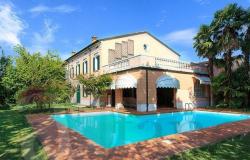 Italian theatre legend Dario Fo has no intention of shuffling off the stage into quiet retirement. As he turns 80 on Friday, the famously feisty Nobel prizewinner still has the fire that turned him into the country's angriest - and funniest - young man.
Italian theatre legend Dario Fo has no intention of shuffling off the stage into quiet retirement. As he turns 80 on Friday, the famously feisty Nobel prizewinner still has the fire that turned him into the country's angriest - and funniest - young man.
"It's good to reach this age healthy and sparky, with a great desire to act, take part in things and, above all, get mad," the performer and leftist activist told ANSA.
The corruption and cronyism denounced in many of his plays wiped away the postwar "explosion of enthusiasm" he felt as a 19-year-old, Fo recalled. But things are even worse now, said the greatest modern exponent of the anti-establishment Commedia dell'Arte tradition.
"Italy is at its lowest ebb. This is the worst moment in its history," said Fo. "Sleaze, confidence tricks and daylight robbery have wiped out all sense of community," said the famously committed artist. Fo is a well-known scourge of Italy's centre-right government and has blasted the "stupidity" of Italians in voting in media mogul Silvio Berlusconi as premier.
But he has even become disenchanted with the left-wing cause for which he has fought all his life. "Politics has turned into a fight for power and
positions, even on the Left, among the comrades". But a passionate interest in youngsters and the belief that they can turn things round has kept him visiting schools.
"The young people themselves come to me and I'm overjoyed to answer their call". Despite a gallery of works festooned with awards from
all over the world, he insists the "thing that gave me the most satisfaction" was a '60s TV show in which he put his verbal pyrotechnics aside to illustrate the achievements of great Italian artists like Leonardo and Caravaggio.
But even as an elder statesman of Italian theatre, the polemics that have dogged his career have shown little sign of going away.
His best-known work, Accidental Death of an Anarchist, came back into the headlines this week after Milan's mayor changed the wording on the city's plaque in memory of the man who plunged to his death from a police station window. Overnight, without fanfare, the word "killed" was
replaced by "died" - reviving a longrunning Left-Right split on whether Pino Pinelli jumped in a break from a three-day grilling or was pushed by police eager to have a fallguy, preferably dead, for a notorious bombing.
Never one to back down, Fo called Mayor Gabriele Albertini a "wretch" who didn't "know the facts of the case". The Accidental Death (1970) was one of the works cited by the Swedish Academy when it made him a surprise pick for Nobel in Literature in 1997 - enraging Fo's domestic critics.
"His independence and his clear vision brought him to take great risks," the Swedish Academy said. "Fo's strength lies in creating works that entertain you, challenge you and give you perspective. His is a work of artistic vitality and exceptional breadth". Among some 50 works, the Academy noted his monologue Mistero Buffo (1969), Non Si Paga, Non Si Paga (1974), Clacson, Trombette e Pernacchi (1981) and Diavolo con le
Zinne (1997).
Since the Nobel, Fo has penned a zany, dialect version of the discovery of America and a constantly changing monologue against Berlusconi.
He is currently working on a play highlighting the prominence of women in the early Christian Church - and their later repression by it.
Born near Milan in 1926, Fo studied painting and architecture before getting into the theatre as astage designer immediately after World War II. He soon moved on to writing sketches, varieties and musical comedies. In 1953 Fo formed a cabaret ensemble and the following year married Franca Rame, his star and muse. Fo and Rame quickly made a big enough name for themselves to get a show on state broadcaster RAI.
But they were banned in 1962 after protesting the network's censorship of some of their more political work. The ban lasted for 15 years - a period in which Fo and Rame underwent a radical transformation that seemed to reflect the vast social changes sweeping Italy at the time.
Refusing to be the 'troubadours for the bourgeois,' theybecame radical leftist organizers and performers, holding their shows in piazzas, tents and occupied factories. On the political front, they worked as fundraisers forleft-wing causes and ideologues, collecting funds during shows at their theatrical collective. They also supported drives to liberalize Italy's divorce and abortion laws. Their political leanings were seen as the cause behind the 1973 kidnap and rape of Rame by a fascist group. Fo's satire of the Soviet Union and revisionism within the Italian Communist Party brought him into conflict with the traditional left, leading him to be supported by extraparliamentary groups.
At the same time, Fo became increasingly famous around the world as his comedies were translated into dozens of languages. He has always played down his achievements, describing himself simply as a comedian lucky enough to have a knack for writing. The Nobel, he told ANSA, "was a fantastic stroke of luck".
"I never thought I'd get it. Not once, not in a million years".



